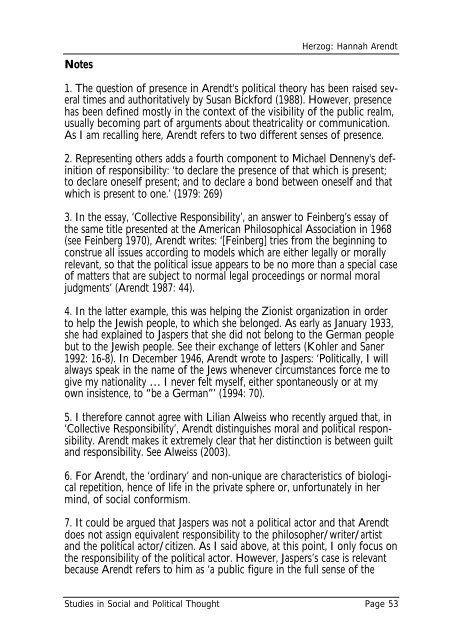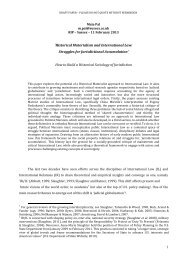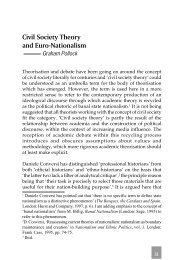Hannah Arendt's Concept of Responsibility - University of Sussex
Hannah Arendt's Concept of Responsibility - University of Sussex
Hannah Arendt's Concept of Responsibility - University of Sussex
You also want an ePaper? Increase the reach of your titles
YUMPU automatically turns print PDFs into web optimized ePapers that Google loves.
Notes<br />
Herzog: <strong>Hannah</strong> Arendt<br />
1. The question <strong>of</strong> presence in <strong>Arendt's</strong> political theory has been raised several<br />
times and authoritatively by Susan Bickford (1988). However, presence<br />
has been defined mostly in the context <strong>of</strong> the visibility <strong>of</strong> the public realm,<br />
usually becoming part <strong>of</strong> arguments about theatricality or communication.<br />
As I am recalling here, Arendt refers to two different senses <strong>of</strong> presence.<br />
2. Representing others adds a fourth component to Michael Denneny's definition<br />
<strong>of</strong> responsibility: ‘to declare the presence <strong>of</strong> that which is present;<br />
to declare oneself present; and to declare a bond between oneself and that<br />
which is present to one.’ (1979: 269)<br />
3. In the essay, ‘Collective <strong>Responsibility</strong>’, an answer to Feinberg’s essay <strong>of</strong><br />
the same title presented at the American Philosophical Association in 1968<br />
(see Feinberg 1970), Arendt writes: ‘[Feinberg] tries from the beginning to<br />
construe all issues according to models which are either legally or morally<br />
relevant, so that the political issue appears to be no more than a special case<br />
<strong>of</strong> matters that are subject to normal legal proceedings or normal moral<br />
judgments’ (Arendt 1987: 44).<br />
4. In the latter example, this was helping the Zionist organization in order<br />
to help the Jewish people, to which she belonged. As early as January 1933,<br />
she had explained to Jaspers that she did not belong to the German people<br />
but to the Jewish people. See their exchange <strong>of</strong> letters (Kohler and Saner<br />
1992: 16-8). In December 1946, Arendt wrote to Jaspers: ‘Politically, I will<br />
always speak in the name <strong>of</strong> the Jews whenever circumstances force me to<br />
give my nationality … I never felt myself, either spontaneously or at my<br />
own insistence, to “be a German”’ (1994: 70).<br />
5. I therefore cannot agree with Lilian Alweiss who recently argued that, in<br />
‘Collective <strong>Responsibility</strong>’, Arendt distinguishes moral and political responsibility.<br />
Arendt makes it extremely clear that her distinction is between guilt<br />
and responsibility. See Alweiss (2003).<br />
6. For Arendt, the ‘ordinary’ and non-unique are characteristics <strong>of</strong> biological<br />
repetition, hence <strong>of</strong> life in the private sphere or, unfortunately in her<br />
mind, <strong>of</strong> social conformism.<br />
7. It could be argued that Jaspers was not a political actor and that Arendt<br />
does not assign equivalent responsibility to the philosopher/writer/artist<br />
and the political actor/citizen. As I said above, at this point, I only focus on<br />
the responsibility <strong>of</strong> the political actor. However, Jaspers’s case is relevant<br />
because Arendt refers to him as ‘a public figure in the full sense <strong>of</strong> the<br />
Studies in Social and Political Thought Page 53
















